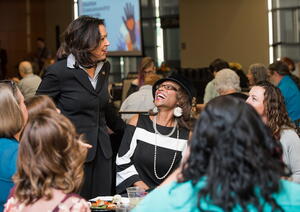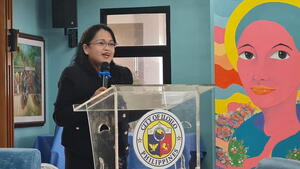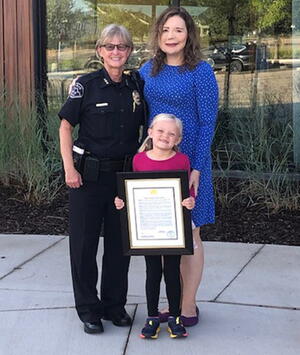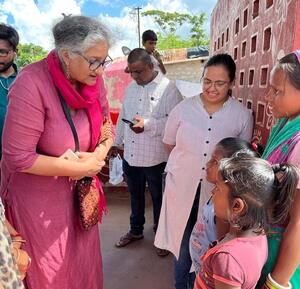
View the flipbook version or download a pdf of this special section here.
Around the world, there are extraordinary and successful women local government leaders who are dedicated to improving service delivery and creating diverse and sustainable communities. As a result, the local government management profession has witnessed significant progress toward gender balance over the last few decades.
In 1974, ICMA established the Task Force on Women in the Profession to confront the fact that only one percent of chief administrative officer (CAO) positions in local government in the United States and Canada were filled by women. Ever since, ICMA has continued to champion the inclusion of women in local government administration. Over the past 50 years, we have made significant strides to help increase opportunities for women to serve as CAOs, who now serve in 23% of CAO positions nationwide.
In celebration of International Women’s Day on March 8, 2024, and Women’s History Month in the United States, ICMA interviewed leaders around the world about their experiences in local government and what they see for the future of the profession.
Fine-Tuning Skills for Success
In honor of 100 years of the “I” in ICMA, we interviewed women from around the world about skills needed to be successful in local government. While a wide variety of responses were received, there were many similar themes. One idea that resonates globally is the importance of continually learning and developing soft skills such as open-mindedness, respect, compassion, and humility. Open-mindedness helps with other soft skills, as well as the technical aspects of local government management, while respect, compassion, and humility are important for good public service and personal mental health. Embracing these qualities can elevate women’s leadership and inspire others to work toward shared goals and contribute positively to their organization’s overall success.
Chelsea Jackson, deputy city manager, Douglasville, Georgia, USA, explains, “The hard skills I possess have allowed for advancement but it’s empathy, customer service, and

great communication, among other skills that have allowed me to grow further in my career.” Other respondents agreed and noted that many of the soft skills require continual learning.
“It includes having constant curiosity with an open mind, admitting mistakes and learning from them, and making time to learn,” adds Samantha Tavares, special projects administrator, Phoenix, Arizona, USA. This learning can come from anyone and anywhere.
As Betsy Keller, ICMA-CM, county administrator, El Paso County, Texas, USA, says, “I am continually trying to cultivate these qualities in myself through watching, listening, and learning from others who have these traits, whether it is attending an ICMA session; learning from other county administrators, department heads, or elected officials; or watching my courageous and kind grandchildren!”

Elaine I-Lan Wang, town manager, Winooski, Vermont, USA, explains how one soft skill might help you with others or with “hard skill” problems. They say, “If I had to pick one, it would be openmindedness. This shows up in several ways. For example, you can’t predict where a good idea is going to come from. Don’t discount who might come up with one, or where, when, or how. Another way is taking every complaint at face value. Don’t discount the content based on the tone in which it’s delivered, or the history of the person delivering it. For me, openmindedness goes hand-in-hand with other important qualities for a successful local government leader: respect and compassion for others, humility, flexibility, and scanning for and responding to significant trends. Respect, compassion, and humility aren’t just important for good public service but also your own personal mental health (which promotes your success). I don’t have to have all the answers because I respect others enough to have them be part of the solution. If I’m humble, I can give and receive compassion. Cultivating the quality of open-mindedness is really about cultivating a habit. Like any habit, I remind myself, practice it, note the positive outcomes when I do it, and don’t beat myself up for when I lapse, but just encourage myself to keep at it.”
Natalia Petrenko, mayor, Shulhynka, Ukraine, says, “The best portrait of a leader is an effective, honest, and fair manager who strives to improve the living conditions of his or her population in his or her territory. It is very difficult to find the right approach to different segments of the population at the same time. It is a constant way out of the comfort zone. A person must be stress resistant.”
As Shawna Davis, city administrator, Odessa, Missouri, USA, explains, “I strive to instill qualities such as integrity and resilience within the organization’s culture. The staff should know that I will fight for the greater good, no matter the circumstances. We are a team working towards the common goal of providing the best possible services to the community that we love.”
Vicki Mayo, CEO, Local Government Professionals NSW, Australia, adds that a diverse range of skills is needed and highlights the importance of learning from your team. “Local government professionals need both management and leadership skills to be effective in today’s dynamic work environment. We need to have the strategic and business skills to set plans and policy for growth and sustainability — we need project management skills, facilitation skills, and negotiation skills — but more than ever, we need the ability to lead and manage people in a range of ways and through various circumstances that many of us have not seen before. We need to hone our communication skills, both internally with our teams, and externally with our communities. We need to ensure clear expectations of roles and responsibilities, and we need to prioritize mental health and well-being. I am lucky to work with some of the best learning and development professionals in the business, so I learn a lot from them, but I also take time to network with my peers to learn from their lived experiences.”

Penny Postoak Ferguson, ICMA-CM, county manager, Johnson County, Kansas, USA, notes that part of these soft skills may include acceptance of the realities of the field. She explains, “You need to know that many areas in local government, such as leadership, have fewer women so you may have to work extra hard and receive additional scrutiny. Accepting this and knowing that it can make you stronger will serve you well. Be brave and do not underestimate what you contribute in your own unique way. Skills that are needed more than ever are knowing how to navigate in times that are not as civil, having humility, and understanding how to develop an annual budget, the most important policy document of the year.”
Work-Life Integration
Balancing work and personal responsibilities all while maintaining health and well-being are crucial to success as a local government leader. However, it is not always easy and requires both personal management and help from your team or other leaders around you to truly achieve success. While many of the women leaders we heard from indicated that they had taken steps toward better work-life integration, many have found that it’s helpful to take a new perspective on the perpetual challenge of balancing one’s personal life and professional life.

For Ma. Veronica C. Hitosis, executive director, League of Cities of the Philippines, “Work and life balance remains an ongoing effort. The key is having good foundational values and principles: integrity, honesty, grit, and hard work.” Emily Lewis, deputy county administrator, Charlotte County Board of County Commissioners, Florida, USA, adds, “I’ve learned to give myself grace (and permission) to not get it all done every day and to prioritize what is most important to achieve in the limited hours I have in a day. Finally, I’ve come to the realization that it will all be okay in the end and if it’s not ok, it’s not the end.”
Other women commented on the term work-life balance itself, which may set unrealistic expectations. Tanya Ange, ICMA-CM, county administrator, Washington County, Oregon, USA, and incoming ICMA president, says, “I’ve grown skeptical of the idea of work-life balance, largely because I’ve never been able to achieve it. I’ve always strived to give more to my organization, more to the community, and more to my family. A more realistic strategy for me is work-life integration. This approach involves continuous time management. I’m a morning person, so I take time at the beginning of each day for exercise, mindful reflection and focusing on gratitude. Mindfulness is important for resilience, and we need all the resilience we can get in public service.”
Jennifer Prochazka, assistant city manager, College Station, Texas, USA, takes a slightly different angle saying, “I don’t believe in ‘work-life balance’ anymore. For a large part of my career, it was a phrase that made me believe that if I found the perfect spot on the scale, I’d be successful at work and present at home without stress or guilt. But, for me, the focus shifted between home and work when it needed to, and some days were easy, and some were hard. Now, I prefer to think of it all as just ‘life’—your home, partner, children, hobbies, friends… and work. These pieces combined make up your life, and work shouldn’t be the four-letter word in the mix. Find a career that helps fulfill you — something that you’re good at and that you can be proud of — and then find a place with people that support growth in all aspects of your life.”
Kelly McAdoo, city manager, Hayward, California, USA, adds to the advice about finding a career that supports you, “I have a saying that ‘some weeks I’m a good mom and some weeks I’m a good employee and it all balances out.’ We can’t be all things to everyone and there is no perfect balance. Depending on where you are in your career or your life, you may have to make choices about the positions you accept or the extra activities you take on and that is 100% okay. Only you know what is right for you and if you have to take a small detour for a few years, that is okay as well. Something to consider when you are interviewing for new roles: if you have small kids or elderly parents to care for, make sure your governing body or bosses understand or are comfortable with those commitments. If they aren’t, it probably isn’t the right fit for you right now.”
It’s ideal to have a work environment that fits your life needs. This can include team members that you know you can depend on, a supportive management structure, or even rules or legal requirements. Situations around the world are different, but there are many examples of both formal rules and informal support structures that have helped along the way.

Pam Davis, assistant city manager, Boulder, Colorado, USA, ICMA vice president, Mountain Plains, explains about a recent experience that led her to seek assistance from those in her community, both at work and at home. While both her experience and seeking assistance were challenging, the outcome was positive. “[A] major and more recent career challenge has been maintaining my professional energy while also becoming a parent, navigating family needs, and trying to prioritize my mental and physical health. This reached a nearly unmanageable point in early 2023, when the accumulated stress and trauma of the previous three years had me questioning if I could keep going in my career. Digging back out of all I was carrying started by asking for help, first from family and friends, then my doctor and therapist, and ultimately my team at work. While I was afraid to admit that I was struggling, I received compassion and support to take a break from work and invest in myself. Letting go of the fear of being seen as human was the greatest gift — it freed me to spend time clarifying my priorities, adopting new self-care practices, and after several weeks, returning to my job with more gratitude and passion for the work than ever.”

Laura Graham, project manager, Calgary, Alberta, Canada, shared that women (and really all local government professionals) should not be afraid to ask for help. She says, “if you have an immediate family need, worry about yourself and your family first. Your team is there to support you, and the work will get done. This has been a tough lesson for me to learn, but by being vulnerable with my team I have found that people are more willing to support you when you need them most. Trust in your team is everything.”
Dáša Jakubíková, city manager, Partizánske, Slovakia, notes that there is a balance between personal work and having a support system. She reflects, “What I learned about myself is that my working time does not depend on the place where I work, but it is caused by me wanting to accomplish too much in too short of a time. So, work-life balance is something I have to work on intentionally every day, starting with assessing whether the deadlines of tasks and projects are realistic, and whether the team is capable and how to support it, while continuing my daily routines of a healthy diet, regular exercise, enough sleep and relaxation, and of course, having family and friends who support me.”
Many countries around the world offer generous leave policies or other support systems and, while this is not available everywhere, women should take advantage of what is offered and use it in a way that works for them.
Titia Bijma, policy advisor on shared mobility, Nijmegen, The Netherlands, highlights how she has taken advantage of the leave policies for new parents. “When our son was born
1.5 years ago, I had to figure out my work/personal balance again. If he is sick, for example, my priorities shift toward caring. Luckily, my employer gives me the space to catch up on work tasks at another moment, such as later in the evening. In the Netherlands, you can also take quite some time off when you have children: 16 weeks for maternity leave (six weeks for partners), but also 26 weeks of parental leave for both parents (of which nine weeks are 70% paid). I still use four hours of parental leave every week to be more at home in these first years.”
In Belgium, Cathy Brouckaert, finance director, Bruges, says, “Balancing a career and family, especially with four children, including seven-year-old twins, is a demanding yet rewarding journey. The key to managing this delicate balance lies in organization and strategic planning. Crucially, the exceptional flexibility and support provided by the Bruges municipal administration have been instrumental. The local government, under the leadership of general manager, Colin Beheydt, ICMA vice president, international region, embraces progressive approaches to work organization, empowering women by providing ample flexibility. This forward-thinking mindset within the organization allows women, like me, to thrive in demanding roles without compromising family commitments."
"I truly believe that fostering such forward-looking organizational cultures is vital for women to shatter the glass ceiling and aspire to the same positions as men. Offering flexibility and supportive environments enables women to excel in their careers while fulfilling familial responsibilities. I hope more organizations adopt similar approaches, recognizing that this inclusivity not only benefits women but also contributes to a more diverse and effective workforce.”
Inclusivity for All
Diversity, equity, and inclusion efforts are expressed differently around the world depending on what is important in the cultural context. Despite these differences, the outcomes of increased inclusivity and workforce diversity benefit all local governments and the communities they serve.
Hemanthi Goonasekera, executive director, Federation of Sri Lankan Local Government Authorities (FSLGA), explains, “When the services are provided to the communities, they must remind themselves of the importance of equity and equality as the society they serve is very diverse. Local councilors are the first respondents to the local needs; hence they need to know the needs, challenges, and aspirations of their communities. Sometimes local leaders can seek some solutions jointly. People are willing to accept reality if you show your integrity. As the national association, we are very much focused on providing the services needed by our members, the local councils. Their needs are also diverse, and their capacities are also different from one another. We respect the dual language policy, and our services are provided in both Sinhala and Tamil Languages [the two main languages spoken in Sri Lanka]. FSLGA is an equal opportunity employer. I am happy to say that 80% of our staff are female. I respect and accept diversity and believe that it creates a beautiful world.”
Valmarie Turner, ICMA-CM, deputy city manager, Fairfax, Virginia, USA, ICMA vice president, southeast region, notes that local government leaders have a responsibility to make diversity and inclusivity a priority. “We must create an environment and shared spaces where differences are valued, supported, and celebrated. It is important to prepare a diverse group of leaders—including women—within our organizations by equipping them with the skills, opportunities, and confidence to lead. Intentionality is crucial to moving the needle on gender balance and diversity in leadership positions.”

Despite the progress that has been made by women in the workforce, certain issues still remain. Courageous women are advocating for themselves and others to continue to effect positive change and move the needle on inclusion.
Shelley Bontje, project manager, Dutch Cycling Embassy, Utrecht, The Netherlands, explains. “Sexism is still an important and pressing issue, which needs to be addressed in all kinds of organizations. I am still hopeful that one day everyone will be judged on the merits of their work, not their appearance. I truly believe that a government whose employees represent local communities will result in better policies. In my experience, not all local governments will feel inviting and inclusive to young women from the start. Nevertheless, I would still encourage young women to pursue a career in local government. It’s unfortunately true that some change needs to come from the inside. We need great minds and likeminded spirits to enable change and create the kind of world that we want to work and live in.”
Jennifer Goodine, executive director, Canadian Association of Municipal Administrators (CAMA), shows how her career flourished despite challenges along the way. “As a woman, the assumption that I may not move up the career ladder, or be considered for promotions, posed a unique set of challenges. Navigating these challenges demanded a strategic, multifaceted approach to breaking gender stereotypes. I committed to consistently showcasing my capabilities through high-quality work, leadership, skill acquisition, and mentorship to challenge preconceived notions. I believe my career trajectory stands as proof that dedication, resilience, and a proactive mindset can break barriers, fostering professional growth and recognition for women in leadership.”

Melissa Wiley, deputy town manager, Erie, Colorado, USA, details her experience in creating an inclusive environment. Unfortunately, there are still negative perceptions of those who look different from others, but perceptions have improved over the last 50 years as people like Melissa continue to advocate for herself and others. She explains, “The biggest challenge in my career has been leading at an executive level as a facially disfigured woman. I was attacked by two dogs as a child and even after over 30 reconstructive surgeries, my scars and disfigurement are still quite noticeable. Up until the 1970s, a series of [U.S.] municipal laws commonly referred to as the ‘ugly laws’ prevented people like me from seeking and securing meaningful employment, let alone leading government. Thanks to the Americans with Disabilities Act (ada.gov), these laws are no longer tolerated but their legacy is powerful. Many people still struggle to see me as a valuable leader or person, despite my education and experience. I am often in a position where I need to win people over before they feel comfortable with me.
I’ve been able to manage this experience by sharing my story openly and leading from a place of authentic strength in my own heart. One of my favorite quotes comes from Anne Lamott: ‘I decided that the most subversive, revolutionary thing I could do was to show up for my life and not be ashamed.’ It’s easy to feel ashamed as a woman who doesn’t measure up to society’s beauty standards, so I’ve created a new definition of beauty for myself. One that’s centered in lifting the light in others and, in a strange way, I think I’m better at seeing the real beauty in others because I hold a broader and bigger definition of beauty for myself.”
It also takes effort from those who may be in the majority to advocate for those who are not. Rebecca Ryan, general manager, Queanbeyan Palerang Regional Council, NSW, Australia, ICMA vice president, international region, says, “Local governments can better support gender balance and diversity by ensuring we have leaders who are representative of all genders and demonstrating an inclusive and diverse workplace. Being understanding of peoples’ needs and different styles, supporting work/life balance (e.g., working from home, working away from home at your workplace, being flexible for part time and shorter weekdays and weeks). Ensuring that we are recruiting and employing people from all backgrounds, ages, genders, religions and removing any form of bias in our recruitment practices. Having recently employed a young man with special needs, who has been on a disability pension since leaving school until now, my mantra especially at the moment is don’t ‘dis’ my ability.”
Pursuing a Local Government Career
The face of professional local government management is changing. No longer does the basic career path stem from traditional MPA programs from which individuals move through the pipeline, from intern to chief administrative officer. For some, their career path can be described as organic and sparked out of personal necessity.
“I am an accidental local government employee. I had planned to work for a multi-national company and spend time in Latin America after getting my MBA,” shares Graham, “but the U.S. housing crisis and economic recession of 2007 had other plans for me.”
Others were molded early by passionate family members and public servants. “My father worked for the Provincial Government and since I admire and respect him, I found myself following his path,” reflects Jennifer Lawson, city clerk/assistant director legal, city clerk and human resources, Fredericton, New Brunswick, Canada, “I moved to local government as I found that the work is interesting, the people who work here are passionate about their city, and you can see the impact you are having.
While no two paths are identical, “There is a place for you in local government to learn, grow and excel as a professional,” shares Turner, “Women bring a unique skillset and perspective to the work environment that is needed and supported. We are smart, capable leaders and it is important for women to be on the team and leading the way.”

Eunice Segatlhe-Lesejane, deputy president and chairperson of international affairs, Institute for Local Government Management (iLGM), and municipal manager, Mogale City, South Africa, suggests, “Young women should skill themselves with new legislations in local government and should assert themselves in the positions they are holding. They should always seek knowledge through improving themselves academically in the local government sphere.”
“I encourage young women to pursue their passion,” shares Stacy Rodgers, county administrative officer, Baltimore County, Maryland, USA, “and explore a range of opportunities and find that which you feel meets your skills, expertise, and interest. Seek out those individuals who are serving in roles that you are interested in and talk with them about your interest. Conduct informational interviews. Seek out a mentor. Join a professional organization like ICMA to continue to enhance your skills and expertise and commit to lifelong learning. There are so many wonderful opportunities in local government where you can make a difference.”
“Apply for the positions that interest you even if you don’t believe you have every single one of the skills desired by the hiring agency,” Pam Antil, ICMA-CM, city manager, Encinitas, California, USA, ICMA vice president, west coast region, adds. “Throughout my career I’ve seen people (mostly men) who were appointed to positions that I was more qualified for, but I didn’t think I had a chance to be selected, so I never applied. Interviewing and not getting a job also builds great skills for the future. I interviewed for 18 city manager positions before I was offered the position in Encinitas. Never. Give. Up.”
Conclusion

Women in local government are shattering glass ceilings, dismantling stereotypes, and forging a path for the next generation of women in the profession. As Manvita Baradi, founder and director, Urban Management Centre, Ahmedabad, India, shares, “Perseverance and focus are crucial. Pursue your beliefs, and hard work will pay off. Don’t let biases of caste, class, gender, or religion deter you.”
We’re grateful to the women who contributed their experiences to this article, and since we couldn’t include everything they had to say, we plan to share more from them at a later date.
For support, career resources, and a unique networking platform for women in local government management, look to SheLeadsGov, a global ICMA initiative aiming to promote gender equity. Join us for the free SheLeadsGov Virtual Forum, “Bold Women, Bold Changes,” on March 6 — or after the event, listen to the recordings of this year's event and previous years' recordings. Learn more here about the work that ICMA is doing with local government professionals around the world.
New, Reduced Membership Dues
A new, reduced dues rate is available for CAOs/ACAOs, along with additional discounts for those in smaller communities, has been implemented. Learn more and be sure to join or renew today!
